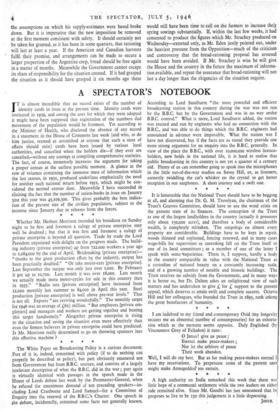It is lamentable that the National Trust should have to
be begging at all, and alarming that Dr. G. M. Trevelyan, the chairman of the Trust's Courses Committee, should have to use the word crisis on the- present state of its finances. The conception of the Trust as one of the largest landholders in the country (actually it possesses only about 15o,000 acres5 and therefore a body of considerable wealth, is completely rridaken. The outgoings on almost every property are considerable. Buildings have to be kept in repair, woods thinned and replanted, fencing renewed, and in many cases wage-bills for supervision or caretaking fall on the Trust itself or one of its local committees ; as a member of one of the latter I speak with some 'experience. There is, I suppose, hardly a body in the country comparable in value with the National Trust as a custodian of national beauty on a constantly increasing scale, and of a growing number of notable and historic buildings: The Trust receives no subsidy from the Government, and in many ways it is better so, but Dr. Dalton takes an enlightened view of such matters and has undertaken to give £ for £ support to the present appeal, which deserves to attain swift and complete success. Octavia Hill and her colleagues, who founded the Trust in 1895, rank aniong the great benefactors of humanity.
* * *


























 Previous page
Previous page